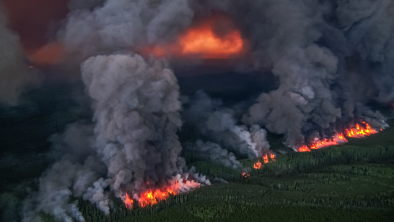The BC Government Unveils Pay More Get Less Approach to Parks
Monday, March 22, 2010

Last Friday, a day of the week typically reserved for announcing unpopular decisions, the BC government quietly announced fee increases for provincial parks.
User fees take effect April 1 for a range of recreation activities including camping, backcountry overnight hiking, mooring buoy fees as well as sani-station access. “It’s a disturbing approach: cutting park rangers, axing park interpretive programs, reducing the park budget, closing outhouses, and then charging people increased fees for decreased levels of service,” said Gwen Barlee, policy director with the Wilderness Committee.
“The BC government seems to believe they can charge the public more for less when it comes to our park system. I guess that is why they have chosen April Fool’s Day for this to take effect,” said Barlee.
Last April, the BC government incurred public wrath when they slashed summer park ranger positions by 40 per cent. This came on top of cuts to full-time permanent rangers which have been reduced by more than 60 per cent since 2001, down to just 10 permanent year-round ranger positions.
This February, the government cut BC Parks operational budget by $600,000 with another $ 1 million forecast to be cut by 2013.
“This is a government that only pays lip service to our park system. In the last ten years park visits have dropped by 25 per cent, our trail system is falling apart, park rangers have become an endangered species and basic park services have been gutted. This is what you do when you want to drive a park system into the ground,” said Barlee.
“Next year marks the 100th anniversary of our provincial park system, but the BC government is celebrating it by starving our protected areas of funding and staff,” said Barlee.
Controversy about the management of BC’s 13.5 million hectare parks and protected area system has dogged the provincial government. In addition to fee increases, the government also drew criticism for an initiative to allow private resorts in parks, installing parking meters, weakening the Parks Act and changing park boundaries to allow for industrial development.
Much of the government’s rationale for cutbacks in parks is premised on the mistaken notion that parks don’t pay for themselves. However, a BC government report shows that for every $1 the government spends on protected areas in BC, more than $10 is returned to local economies through visitor expenditures.
-30-
For more information please contact:
Gwen Barlee, Policy Director, Wilderness Committee, 604-202-0322 or 604-683-8220 (w)
“The BC government seems to believe they can charge the public more for less when it comes to our park system. I guess that is why they have chosen April Fool’s Day for this to take effect,” said Barlee.
Last April, the BC government incurred public wrath when they slashed summer park ranger positions by 40 per cent. This came on top of cuts to full-time permanent rangers which have been reduced by more than 60 per cent since 2001, down to just 10 permanent year-round ranger positions.
This February, the government cut BC Parks operational budget by $600,000 with another $ 1 million forecast to be cut by 2013.
“This is a government that only pays lip service to our park system. In the last ten years park visits have dropped by 25 per cent, our trail system is falling apart, park rangers have become an endangered species and basic park services have been gutted. This is what you do when you want to drive a park system into the ground,” said Barlee.
“Next year marks the 100th anniversary of our provincial park system, but the BC government is celebrating it by starving our protected areas of funding and staff,” said Barlee.
Controversy about the management of BC’s 13.5 million hectare parks and protected area system has dogged the provincial government. In addition to fee increases, the government also drew criticism for an initiative to allow private resorts in parks, installing parking meters, weakening the Parks Act and changing park boundaries to allow for industrial development.
Much of the government’s rationale for cutbacks in parks is premised on the mistaken notion that parks don’t pay for themselves. However, a BC government report shows that for every $1 the government spends on protected areas in BC, more than $10 is returned to local economies through visitor expenditures.
-30-
For more information please contact:
Gwen Barlee, Policy Director, Wilderness Committee, 604-202-0322 or 604-683-8220 (w)


